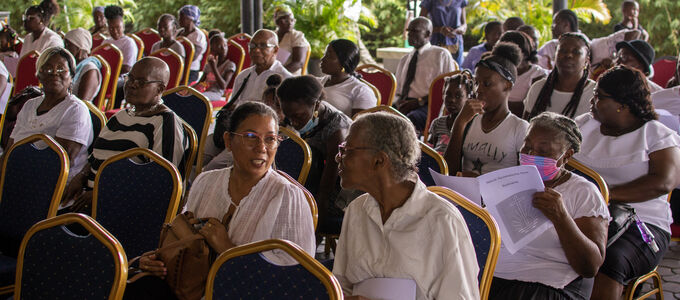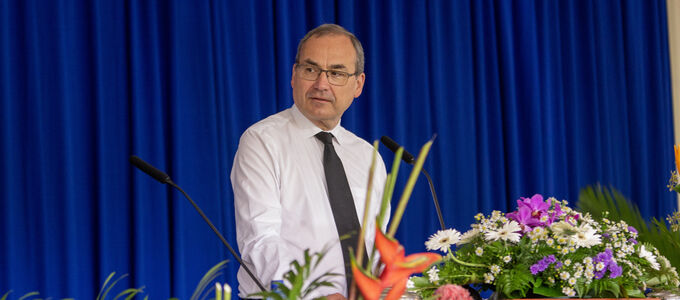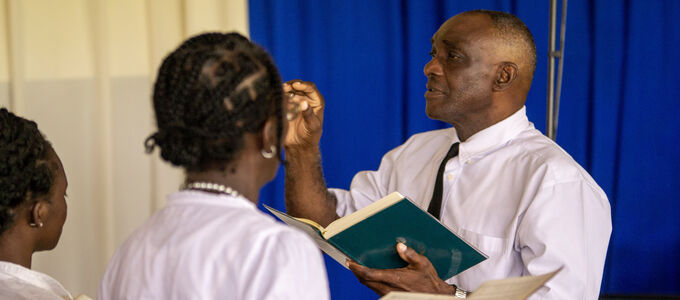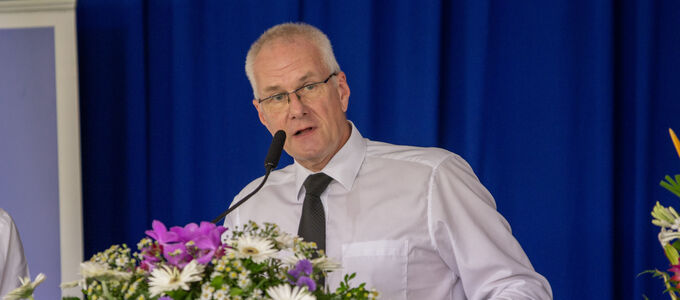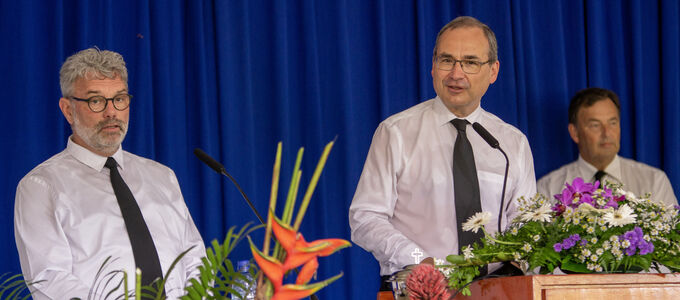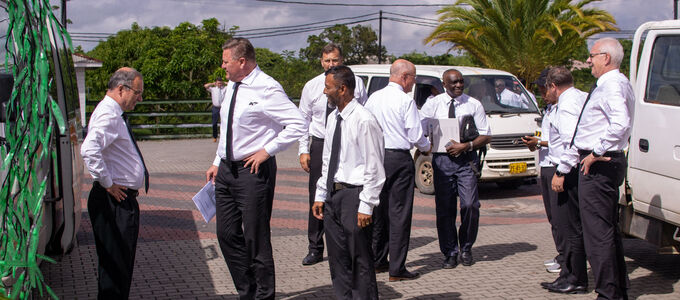A small contribution, but a great example
All of us can do our part. And it is not the amount that counts, but rather the love behind it—that is what the poor widow in the temple showed us. What believers today can learn from this example was the subject of a divine service in Paramaribo, Surinam on 31 July 2022.
“Our Bible text today is an excerpt from one of the shortest stories ever told by Jesus Christ.” It was with these words that Chief Apostle Jean-Luc Schneider introduced the verse from Luke 21: 3–4: “So He [Jesus] said, ‘Truly I say to you that this poor widow has put in more than all; for all these out of their abundance have put in offerings for God, but she out of her poverty put in all the livelihood that she had.’”
“Jesus was in the temple and saw the wealthy bringing their gifts,” the Chief Apostle explained. “And a large offering box had been set up there, and the wealthy contributed a great deal of money. Jesus, however, saw a very poor widow. At that time in Israel, a woman who had lost her husband had no more money. She had no one to provide for her. Yet this widow came and placed a very small amount of money into the offering box. And concerning this, Jesus stated that she had given much more than the wealthy! The rich, after all, had given of their surplus, in other words, that which they had left over, which they did not need. However, the widow gave of that which she needed to survive.”
Jesus loves the poor
“Here we can see once again that Jesus always had a special place in His heart for the poor,” emphasised the Church leader. “He had a special relationship with the poor in Israel, and He also had a special interest in them.”
Why? “Because He shared their sufferings. “The Jews of that time believed that wealth was a manifestation of blessing, and that poverty was a sign that God did not love that person. “Jesus wanted to show: ‘That is simply not true!’” God loves all people and shares in their suffering, but: “God is especially close to the poor, who suffer the most from the consequences of sin. The poor suffer as a result of the unrighteousness that prevails in the world.”
Jesus desires the salvation of all
“Jesus wants to bring salvation to all, both poor and rich,” emphasised the Chief Apostle. “And for Jesus, salvation did not consist of revolutionising society and dismantling all its injustices.” He had come in order to redeem all human beings from sin. In order to achieve this there is but one rule: “You must love God with all your heart, with all your soul, and you must love your neighbour as yourself.”
Loving God with our whole heart
And this is what the widow demonstrated: she loved God “with all her heart and with all her strength,” explained the Chief Apostle. Despite her need, she loved God—and it was important to her to bring her love to expression and give something to God and to meet Him in the temple. The opportunity to contribute to the maintenance of the temple with her offering was therefore just right for her.
She is also an example in trusting God. She placed the same amount of money that she would have needed for a whole day into the offering box. “She knew: ‘I am giving this to God, and I trust Him. He will make everything right. He will certainly provide for me.’”
What does this mean for us today?
The widow is also an example of what it means to love God with all our heart, no matter how we happen to be doing at a particular point in time. And the story also shows that “it is not what we give God that is important, but rather that which we do not give Him.” The Chief Apostle asked his listeners to ask themselves whether they at times attach more significance to other things than to their fellowship with God, and to think about what things they might give up in order to strengthen their fellowship with God. The Church president recalled the widow’s trust that God would provide for her: “Let us muster such childlike trust in God, our heavenly Father.”
The church as a temple
For Christians today, the church represents what the temple represented for the widow at that time. “How important are our encounters with God?” asked the Chief Apostle, making reference to the amount of time that we invest in attending the divine services.
The widow did not think to herself that the wealthy ought to supply the funds to secure the upkeep of the temple. By the same token “we cannot simply say, ‘Well, the work of God, the Church, and all of those things are matters to be handled by the Apostles and the ministers.’” No! The dear God expects each one of us to engage our strength, our energy, and our gifts.”
To conclude, the Chief Apostle stressed that poverty and suffering are not signs that God does not love us or that He has forgotten us. In such situations, “we need God, we need Jesus Christ, and we need one another in life. We also need encounters within the congregation in the divine services.” For this reason it is important to commit ourselves to the Church and to our neighbour, so that everyone can attain salvation and feel at ease in the congregation.
Article info
Author:
Date:
Keywords:
Katrin Löwen
15.09.2022
Suriname,
Chief Apostle,
Divine service




